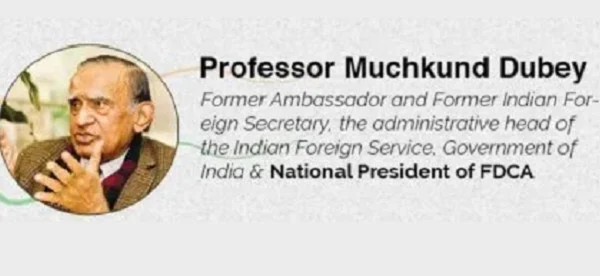NEWS PRISM, DELHI DESK
NEW DELHI: The passing of Prof. Muchkund Dubey has elicited heartfelt condolences from a wide spectrum of society, including diplomats, academics, journalists, peace activists, and interfaith leaders. Recognized as a stalwart in Indian diplomacy and a fervent advocate for peace and communal harmony, Prof. Dubey’s legacy spans decades of service to his nation.
Born in 1933 in Deoghar, Bihar (now Jharkhand), Prof. Dubey began his illustrious career in the Indian Foreign Service in 1957. His tenure saw him hold pivotal positions, including India’s Ambassador and Permanent Representative to the United Nations. Renowned for his astute understanding of international relations, Prof. Dubey later transitioned to academia, where he became a revered professor at Jawaharlal Nehru University’s School of International Studies and established the Centre for Development Studies (CDS) post-retirement.
Throughout his career, Prof. Dubey authored and edited several influential books, such as “Communal Revivalism in India: A Study of External Implications” and “India’s Foreign Policy: Coping with the Changing World.” His intellectual contributions extended beyond diplomacy, encompassing issues of social justice, equality, and India’s evolving role in global affairs.
Reflecting on Prof. Dubey’s impact, Prof. Salim Engineer, Vice President of Jamaat-e-Islami Hind (JIH), spoke of his profound shock at the loss of a mentor and friend. “Prof. Dubey’s clarity of thought, commitment to justice, and advocacy for communal harmony were unparalleled,” Prof. Salim remarked. He highlighted Prof. Dubey’s pivotal role in establishing the Forum For Democracy and Communal Amity (FDCA) during the turbulent aftermath of the Babri Masjid demolition in the early 1990s. Under his leadership, FDCA emerged as a beacon for promoting tolerance, democratic values, and social responsibility across India.
The FDCA, initially chaired by the late Justice V.M. Tarkunde and later led by Prof. Dubey, became instrumental in advocating against communalism and fascism. Prof. Salim praised Prof. Dubey’s unwavering commitment to fostering peace in strife-torn regions and safeguarding civil liberties during times of communal unrest.
Prof. Dubey’s scholarly pursuits were equally notable, with his expertise in South Asian affairs and developmental economics earning widespread acclaim. His ability to bridge academic insights with practical diplomatic solutions marked him as a luminary in both realms.
Beyond his intellectual pursuits, Prof. Dubey’s advocacy extended to championing minority rights, particularly in the face of communal tensions. His collaborations with leaders from various backgrounds, spanning over three decades, underscored his dedication to defending the marginalized and upholding constitutional values.
In addition to his academic and diplomatic achievements, Prof. Dubey’s literary contributions and multilingual proficiency further enriched his legacy. His translations and scholarly works reflected a deep commitment to cultural exchange and understanding.
As tributes poured in, Amitabh Mattoo, a prominent academic, hailed Prof. Dubey as one of India’s foremost scholar-diplomats, lauding his normative approach to global issues. Union Minister Hardeep Singh Puri echoed these sentiments, emphasizing Prof. Dubey’s profound influence on India’s foreign, security, and economic policies.
Former Foreign Secretary Harsh V Shringla highlighted Prof. Dubey’s erudition and humane qualities, noting his enduring impact on Indian diplomacy and intellectual discourse. The Director of Kasturi and Sons Ltd., Malini Parthasarathy, recalled Prof. Dubey’s contributions as a prolific writer and columnist, particularly on South Asian affairs.
Writer and Professor Ashwani Mahajan commended Prof. Dubey’s lifelong dedication to social causes, emphasizing his role in advocating for the underprivileged against corporate interests.
Dr. Anupam Ray, a senior diplomat, paid tribute to Prof. Dubey’s legendary career and his significant contributions to international diplomacy. Renowned historian S. Irfan Habib reflected on Prof. Dubey’s leadership at the Centre for Development Studies, highlighting his enduring influence on successive generations.
Prof. Apoorvanand Jha acknowledged Prof. Dubey’s enduring legacy, underscoring his contributions to Indian diplomacy and intellectual thought. Senior journalist Seema Chishti expressed her condolences, recognizing Prof. Dubey’s distinguished service to the nation.
Dr. Raghubansh Sinha, recalling his interactions with Prof. Dubey during his academic tenure, celebrated his mentorship and profound insights into international trade and finance.
Prof. Muchkund Dubey’s passing represents a significant loss to India’s diplomatic and academic communities.
Courtesy: Indiatomorrow.net

